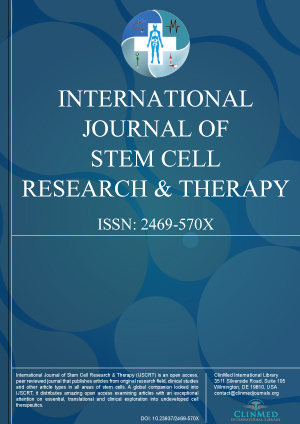Open Access DOI:10.23937/2469-570X/1410016
Regulation of Normal Somatic Cell and Cancer Cell Reprogramming by p53
Jie Yuan and Qin Yang
Article Type: Review Article | First Published: December 24, 2015
Reprogramming healthy somatic cells into disease-relevant cell types through cellular reprogramming has been intensively investigated. The discovery of reprogramming methods holds the promise of generating desired cells for disease modeling, drug screening studies and treatment of numerous diseases. Recently studies also focus on different disease cell reprogramming, including cancer cell reprogramming. Reprogramming and tumorigenesis share many similarities and the tumor suppressor p53 suppress...
Open Access DOI:10.23937/2469-570X/1410015
Neural Stem Cells and their Niches in Neuroregeneration
Jong-Hang Chen, Mei-Shu Chen, Su-Liang Chen and Ing-Ming Chiu
Article Type: Review Article | First Published: December 21, 2015
Stem cell-based therapies in alleviating symptoms or reversing the progression of neurodegenerative diseases and nerve injuries have been investigated extensively. In this review, we first summarize our current understanding of the ontogeny of neural stem cells (NSCs) and their mobilization in vivo. We then focus on the cellular reprogramming in generation of iP-NSCs, iNeurons and iNSCs, and applications of NSCs and iNeurons in cell-based therapy, disease modeling and drug discovery. NSCs belong...
Open Access DOI:10.23937/2469-570X/1410014
Sphingosine 1-Phosphate Receptor 2 Regulates the Migration, Proliferation, and Differentiation of Mesenchymal Stem Cells
S Tucker Price, Thomas H Beckham, Joseph C Cheng, Ping Lu, Xiang Liu and James S Norris
Article Type: Research Article | First Published: December 02, 2015
Mesenchymal stem cells (MSCs) are a multipotent cell population acquired most prominently from bone marrow with the capacity to differentiate into osteoblasts, chondrocytes, adipocytes, and others. MSCs demonstrate the capacity to home to sites of injury and contribute to tissue repair. Sphingosine 1-phosphate (S1P) is a biologically active sphingolipid impacting proliferation, apoptosis, inflammation, and angiogenesis with changes in S1P concentration providing significant implications for vari...
Open Access DOI:10.23937/2469-570X/1410013
Enhancing the Potency of Mesenchymal Stem Cells for Tissue Regeneration
Sylvia Muller, Kenny Dalgarno, Anne Dickinson, Xiao-nong Wang and Lindsay Nicholson
Article Type: Short Review | First Published: November 27, 2015
Mesenchymal stem cells (MSCs) are adult stromal cells with multi-lineage differentiation potential and immunomodulatory properties. They can be isolated relatively easily from several tissues, including bone marrow and adipose tissue and can be expanded ex vivo to yield the large numbers required for a therapeutic dose. As such, MSCs are considered a promising cell source that can be used in cellular therapy for a wide range of diseases, including bone and cartilage defects. However, despite the...
Open Access DOI:10.23937/2469-570X/1410012
Advantage in Human Induced Pluripotent Stem Cells Research of X-Linked Genetic Diseases for Drug Screening
Takeo Kubota
Article Type: Short Review | First Published: October 22, 2015
Human induced pluripotent stem cell (hiPSC) technology has widely been used for modeling of various genetic diseases. In the disease-modeling iPSC studies, it is necessary to generate hiPSC lines from peripheral tissues of multiple patients and of multiple age- and sex-matched control individuals in order to minimize the differences in genetic background that can affect the results. However, we can generate disease model-hiPSC line with mutant allele being expressing and normal control-hiPSC lin...
Open Access DOI:10.23937/2469-570X/1410011
Potential Immune Modulatory Action of Mesenchymal Stem Cell-Derived Extracellular Vesicles in Type 1 Diabetes
Andrea Carpanetto, Chiara Gai, Enrica Favaro, Maria Maddalena Zanone and Giovanni Camussi
Article Type: Short Review | First Published: September 28, 2015
Several preclinical studies have shown potential immune-modulatory properties of mesenchymal stem cells (MSC) in type 1 diabetes leading to phase I/II clinical trials. Immune-modulatory properties of MSC have been mainly ascribed to their secretome. The extracellular vesicles (EV) have emerged as paracrine mediators of MSC actions. In fact, MSC-derived EV have been shown to carry proteins and nucleic acids capable to mimic the effect of originating cells. In the present short review we discuss e...
Open Access DOI:10.23937/2469-570X/1410010
The Role of Mesenchymal Stem Cells in Diabetes Mellitus
Negar Azarpira, Maryam Kaviani and Saeede Salehi
Article Type: Research Article | First Published: July 02, 2015
Diabetes mellitus is a disease characterized by progressive destruction of the beta cells in the pancreatic islets of Langerhans. The current primary treatment is changing the life style and insulin injection. However, this therapy cannot provide sustained physiological glycemic control. Pancreas or islet cell transplantation would be the preferred treatment options. However, the lack of donor tissue immunoincompatibility, cell rejection and using long term immunosuppression are the major barrie...

